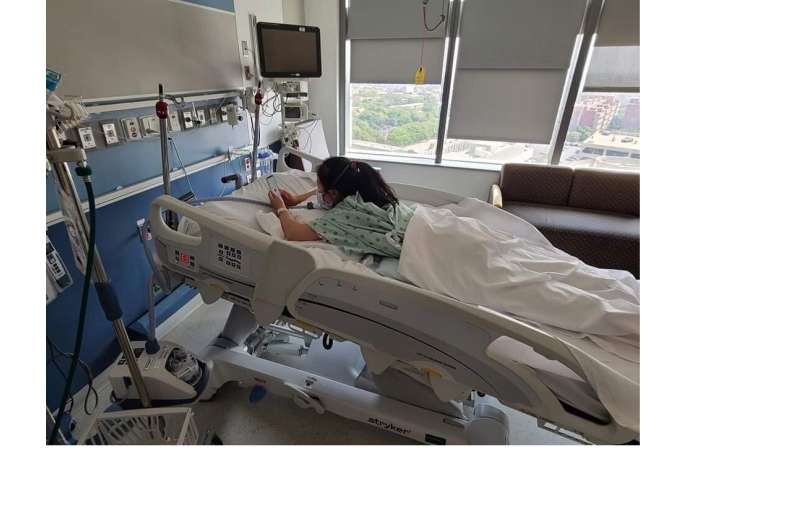How awake prone positioning can prevent intubation in COVID-19 patients

A six country clinical study of more than 1,100 hospitalized COVID-19 patients who required high-flow nasal cannula oxygen therapy suggests that prone positioning (rotating patients with severe breathing issues so they are face down) soon after admission can significantly reduce the need for mechanical ventilation.
While critical care specialists have for years rotated intubated patients with acute respiratory distress syndrome onto their stomachs, this study provides clinical evidence needed to support the use of prone positioning for patients with COVID-19 requiring high-flow nasal cannula oxygen therapy.
The findings, published today in the Lancet Respiratory Medicine, are from the meta-trial conducted in medical centers in the United States, Mexico, France, Canada, Ireland, and Spain onseverely ill patients with COVD-19 between April 2020 and January 2021.
"Breathing in the prone position helps the lungs work more efficiently," explained the study's lead author Dr. Jie Li, associate professor and respiratory therapist at Rush University Medical Center in Chicago, Illinois, United States. "When people with severe oxygenation issues are laying on their stomachs, it results in better matching of the blood flow and ventilation in the lungs which improves blood oxygen levels."
Li noted that several interventions are available to improve oxygenation in critically ill patients. However, there is little outcomes-focused clinical evidence to show that prone positioning prior to mechanical ventilation is beneficial.
In this innovative trial, the authors hypothesized that prone positioning effectively lowered the need for mechanical ventilation in critically ill patients with COVID-19. Adult patients with COVID-19 who required respiratory support from a high-flow nasal cannula, and agreed to participate in this clinical trial, were randomly assigned to the supine or prone positioning groups. They were asked to stay in that position for as long as they could tolerate. Both the supine and prone positioning groups received high-flow oxygen therapy and standard medical management.
Patients were continually monitored to determine if mechanical ventilation was needed. This study's data showed that the prone positioning group were significantly less likely to require mechanical ventilation(33% in the awake prone positioning group vs 40% in the supine group).
Another study lead author, Stephan Ehrmann, MD, Ph.D., from Tours, France said that "for the clinical implications of our study, awake prone positioning is a safe intervention that reduces the risk of treatment failure in acute severe hypoxemic respiratory failure due to COVID-19. Our findings support the routine implementation of awake prone positioning in critically ill patients with COVID19 requiring high flow nasal cannula oxygen therapy. It appears important that clinicians improve patient comfort during prone positioning, so the patient can stay in the position for at least 8 hours a day."
Reducing the need for mechanical ventilation means that resources can be most effectively utilized. "Ventilators can indeed save the lives of people who are no longer able to breathe on their own. That said, we now have strategies to keep patients off the ventilator, saving those devices for the sickest patients who truly need them." Li added.
The meta trial approach: Global approach, timely results
The study also demonstrated a unique design, a meta-trial, which is an original way to combine the efforts of several investigators to speed up necessary research during a pandemic. Traditional multicenter or international trials need a long setup time to implement agreements for the study. The meta-trial approach achieves the goal quickly without losing the rigor of a conventional international randomized controlled trial. A meta-trial combines the features of international prospective randomized controlled trials and a retrospective meta-analysis.
Li lauded the collective, global effort this study represents. "As clinicians and researchers dedicated to helping people breathe, the COVID-19 pandemic has been haunting and demoralizing. But I am very proud and hopeful—the healthcare profession has saved so many lives and simultaneously worked to create the science and evidence-based approaches to patient care—which will save more lives in the future. Science is stronger than fear."
More information: Stephan Ehrmann et al, Awake prone positioning for COVID-19 acute hypoxaemic respiratory failure: a randomised, controlled, multinational, open-label meta-trial, The Lancet Respiratory Medicine (2021). DOI: 10.1016/S2213-2600(21)00356-8




















